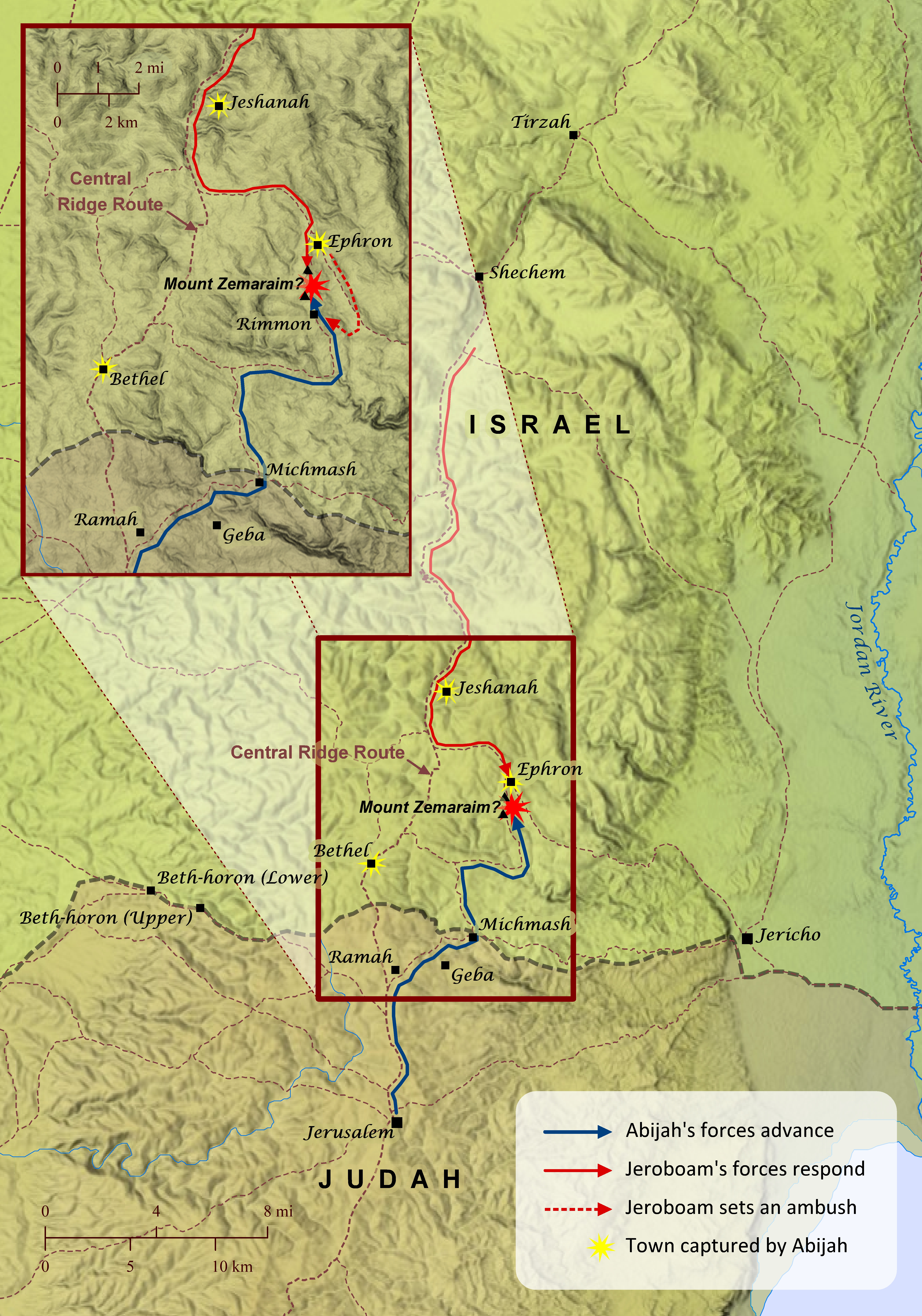Readers’ Version
Literal Version
13 In the eighteenth year of the reign of King Yaraveam (Jeroboam), Aviyah started his reign over Yehudah (Judah). 2 He ruled from Yerushalem for three years. (His mother was Uriel’s daughter Mikayah from Giveah.)
However war started between Aviyah and Yaraveam.
3 Aviyah launched the attack with four-hundred thousand strong warriors, and Yaraveam drew up in formation against him with eight-hundred thousand strong warriors in his army.
4 Aviyah stood on the top of Mt. Tsemarayim in the Efrayim hill-country and shouted, “Yaraveam and all Yisrael, listen to me. 5 Don’t you all understand that Yisrael’s god Yahweh made a formal agreement that the kingdom of Yisrael was given forever to David and his descendants? 6 But Nevat’s son Yaraveam, who was a servant of David’s son Shelomoh, took action and rebelled against his master, 7 and a bunch of wicked good-for-nothings gathered around Yaraveam and created a force against Shelomoh’s son, Rehaveam, when Rehaveam was still an inexperienced, young man and couldn’t stand up to them. 8 So now you’re all saying that you’ll stand against the kingdom that Yahweh established through David’s descendants. There are certainly many of you, and you have the gold calves that Yaraveam made as gods for you all. 9 Didn’t you all drive out the Levites, as well as Yahweh’s priests who were Aharon’s descendants? Then you all appointed for yourselves ‘priests’ like they have in other countries, so that anyone who comes to consecrate himself by bringing a young bull from the herd and seven rams can become a ‘priest’ of your non-gods.
10 “But as for us, Yahweh is our god and we haven’t abandoned him. Our priests who minister to Yahweh are Aharon’s descendants, and the Levites assist them. 11 Every morning and every evening, they sacrifice burnt offerings to Yahweh, and spiced incense. There’s sacred bread on the display table, and the lamps in the gold lampstand give light every evening because we are following the instructions of our god Yahweh, but you all have abandoned him. 12 So listen! God is guiding us and his priests will blast their trumpets to sound against you all. Listen you Israelis: don’t fight against Yahweh, the god of your ancestors, because you won’t succeed.”
13 But meanwhile, Yaraveam had sent some men around to ambush them from behind, so they were both in front of the army from Yehudah and in ambush behind them.
14 When the warriors from Yehudah turned, wow, they realised that they were being attacked from in front and from behind. They called out to Yahweh for help while the priests blew their trumpets. 15 Then the men from Yehudah shouted a loud battle cry and God defeated Yaraveam and all Yisrael in front of Aviyah and Yehudah. 16 Yisrael’s soldiers fled away from Yehudah’s army, and God enabled Yehudah to defeat them. 17 Aviyah and his men thrashed them badly, and some five-hundred thousand of their chosen warriors were killed. 18 So the Israelis were subdued at that time, and the people from Yehudah were victorious because they trusted in Yahweh, the god of their ancestors.
19 Aviyah chased after Yaraveam and they captured the cities of Beyt-El, Yeshanah, and Efron and the surrounding villages from Yisrael. 20 Yaraveam never regained military strength during Aviyah’s reign, and after a time Yahweh struck him with sickness and he died.
21 Meanwhile, Aviyah became more powerful. He took fourteen wives for himself, and had twenty-two sons and sixteen daughters. 22 The rest of what Aviyah did, including his sayings and his behaviour, was written down by the prophet Iddo.
2 Three years he_reigned in/on/at/with_Yərūshālam/(Jerusalem) and_name_of his/its_mother was_Mīkāyəhū the_daughter_of ʼŪrīʼēl from Gibeah and_war it_was between ʼAⱱiyyāh and_between Yārāⱱəˊām.
3 And_ ʼAⱱiyyāh _engaged_in DOM the_battle in/on/at/with_army mighty_men_of war four hundred(s) thousand man chosen and_Yārāⱱəˊām he_drew_up_in_formation with_him/it battle in/on/at/with_eight hundred(s) thousand man chosen mighty_of strength.
4 and_ ʼAⱱiyyāh _he/it_rose_up from_under on_mount_of Tsəmārayim/(Zemaraim) which in/on/at/with_hill_country_of ʼEfrayim and_he/it_said hear_me Oh_Yārāⱱəˊām and_all Yisrāʼēl/(Israel).
5 Not to/for_you(pl) to_know if/because_that YHWH the_god_of Yisrāʼēl/(Israel) he_has_given kingship to_Dāvid over Yisrāʼēl/(Israel) to_forever to_him/it and_to_sons_of_his a_covenant_of salt.
6 and_ Yārāⱱəˊām _he/it_rose_up the_son_of Neⱱaţ the_servant_of Shəlomoh/(Solomon) the_son_of Dāvid and_rebelled on master_of_his.
7 And_gathered on/upon/above_him/it men empty sons_of worthlessness and_became_hostile over Rəḩaⱱˊām the_son_of Shəlomoh and_Rəḩaⱱˊām he_was a_young_man and_inexperienced_of heart and_not he_showed_himself_strong against_face/front_them.
8 And_now you(pl) are_saying to_assert to_(the)_face_of/in_front_of/before the_kingdom_of YHWH in/on/at/with_hand_of the_descendants_of Dāvid and_you(pl) are_a_multitude great and_with_you(pl) calves_of gold which he_made to/for_you(pl) Yārāⱱəˊām/(Jeroboam) for_gods.
9 Not have_you(pl)_driven_out DOM the_priests_of YHWH DOM the_descendants_of ʼAhₐron and_the_Lēviyyiy and_made to/for_you(pl) priests like_peoples_of the_lands every_of the_comes to_consecrate his/its_hand in/on/at/with_young_bull a_young_one_of the_herd and_rams seven and_it_was a_priest of_not gods.
10 and_us YHWH god_of_our and_not abandoned_him and_priests who_serve to/for_YHWH the_descendants_of ʼAhₐron and_the_Lēviyyiy in/on/at/with_service.
11 And_offer to/for_YHWH burnt_offerings in/on/at/with_morning in/on/at/with_morning and_in/on/at/with_evening in/on/at/with_evening and_incense_of perfume(s) and_rows_of bread was_on the_table the_pure and_lampstand_of the_gold and_lamps_of_its to_light in/on/at/with_evening in/on/at/with_evening if/because are_keeping we DOM the_duty_of YHWH god_of_our and_you(pl) you(pl)_have_abandoned DOM_him/it.
12 And_see/lo/see with_us in/on/at/with_head the_ʼElohīm and_priests_of_his and_trumpets_of the_blasts to_sound against_you(pl) Oh_people_of Yisrāʼēl/(Israel) do_not do_battle with YHWH the_god_of ancestors_of_your(pl) if/because not you(pl)_will_succeed.
13 And_Yārāⱱəˊām/(Jeroboam) he_had_caused_to_go_round DOM the_ambush to_come from_behind_them and_they_were to_(the)_face_of/in_front_of/before Yəhūdāh/(Judah) and_the_ambush at_behind_them.
14 And_ Yəhūdāh _turned and_see/lo/see to/for_them the_battle before and_behind and_cried_out to/for_YHWH and_the_priests were_blowing_a_trumpet[fn] in/on/at/with_trumpets.
15 And_ the_man_of _raised_shout of_Yəhūdāh and_he/it_was in/on/at/with_shouted the_man_of Yəhūdāh and_the_god he_defeated DOM Yārāⱱəˊām and_all Yisrāʼēl/(Israel) to_(the)_face_of/in_front_of/before ʼAⱱiyyāh and_Yəhūdāh/(Yihudah).
16 And_ the_people_of _fled of_Yisrāʼēl/(Israel) from_face/in_front_of Yəhūdāh and_gave_them god in/on/at/with_hand_of_their.
17 And_struck in/among_them ʼAⱱiyyāh and_people_of_his a_defeat great and_fell slain of_Yisrāʼēl/(Israel) five hundred(s) thousand man chosen.
18 And_ the_people_of _subdued of_Yisrāʼēl/(Israel) in/on/at/with_time the_that and_ the_people_of _victorious of_Yəhūdāh if/because they_depended on YHWH the_god_of ancestors_of_their.
19 And_ ʼAⱱiyyāh _pursued after Yārāⱱəˊām and_took from_him/it cities DOM Bēyt- ʼēl and_DOM villages_of_its and_DOM Yəshānāh/(Jeshanah) and_DOM villages_of_its and_DOM ˊEfrōn[fn] and_villages_of_its.
20 And_not the_strength_of he_retained of_Yārāⱱəˊām/(Jeroboam) again in/on/at/with_days_of ʼAⱱiyyāh and_struck_down_him YHWH and_he/it_died.
21 and_ ʼAⱱiyyāh _grew_strong and_took to_him/it wives four- teen and_he/it_fathered twenty and_two sons and_six teen daughters.
22 and_rest_of the_matters_of ʼAⱱiyyāh and_ways_of_his and_words/messages_of_his are_written in/on/at/with_story_of the_prophet ˊIddō.
13:14 OSHB variant note: מחצצרים: (x-qere) ’מַחְצְרִ֖ים’: lemma_2690 n_0.0 morph_HVhrmpa id_14yLe מַחְצְרִ֖ים
13:19 OSHB variant note: עפרון: (x-qere) ’עֶפְרַ֖יִן’: lemma_6085 n_0.0 morph_HNp id_14Lmq עֶפְרַ֖יִן


